状语的具体讲解二时间状语
(完整版)状语从句的讲解最全的状语从句讲解

状语从句的讲解就是用一句话作状语分为:时间,地点,方式,原因,结果,条件,让步,目的,比较一、时间状语从句第一次见到你一见到你我就喜欢上了你直到见到你五岁时见到你When, as, while, before, after, since, till/until, as soon as no sooner…than…scarcely…when…hardly…when… the minute the second the instant the moment by the time 截止 immediately instantly directlyeach time every time next time the first time on doing sthwhenwhile 当…时as1。
when 1)当…时/ 延续性动词短暂性动词都可用2)这时/3)届时、到时I was watching TV when my cellphone suddenly rang这时When I was five years old I could speak five languagesThe wet weather will continue tommorow when a cold front is expected to arrive届时到时注意:时间状语从句中动作发生有前后时先发生的用过去完成时When my mother came back I had already gone to bed.2。
while 1)从句动词延续性2)同时发生3)对比的意味“然而”4)趁着He taught himself while he worked in a bank 延续性动词当他在银行上班时While we were working they were having a rest.对比While they were having a discussion , they got very confused。
状语及状语从句(语法加练习完整讲解)

结果状语从句
The problem is so difficult that it will take us time to work it out. 这道题如此难以至于我们要用很多时间才能解决。
She is such a kind girl that everyone likes her. 她非常善良,以至于每个人都喜欢她。
not that...but that...(不是因为...而是因为)
条件状语从句
If you want to succeed, you'd better work hard. 如果你想成功,最好努力工作。 I'll come unless it rains. 除非下雨,否则我一定来。 You can borrow the book as long as you promise to keep i Ming studied so hard that he caught up with the others very quickly. 李明学习如此努力,结果很快赶上了其他人。
6.程度状语: I nearly forgot what he had promised. 我几乎忘记了他答应的事。
(2)如果动词前有一个或几个助动词,状语位于第一个 助动词之后。 He has already had his lunch.他已吃过午饭了。
(3)如果动词是be,状语就放在be动词之后。 He is always at home. 他总是在家。
3.状语位于句末,这是状语的通常位置。
We get up at six in the morning. 我们早晨六点起床。
三、状语的分类:
状语按用途可分为:地点、时间、原因、目的、 结果、条件、让步、程度、方式、伴随情况等几类。
学习中常用的时间状语及用法
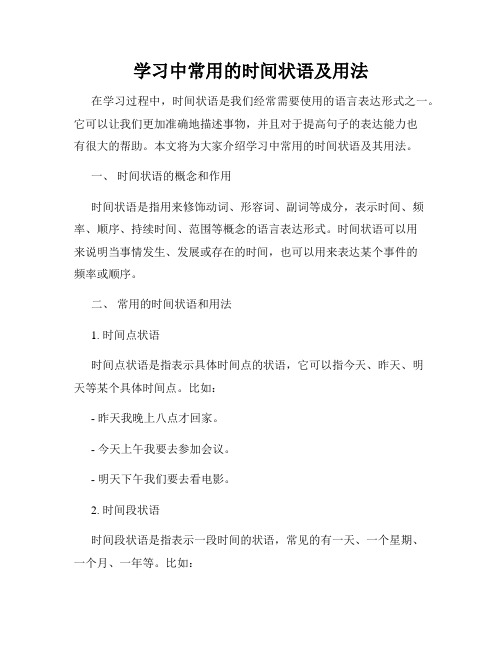
学习中常用的时间状语及用法在学习过程中,时间状语是我们经常需要使用的语言表达形式之一。
它可以让我们更加准确地描述事物,并且对于提高句子的表达能力也有很大的帮助。
本文将为大家介绍学习中常用的时间状语及其用法。
一、时间状语的概念和作用时间状语是指用来修饰动词、形容词、副词等成分,表示时间、频率、顺序、持续时间、范围等概念的语言表达形式。
时间状语可以用来说明当事情发生、发展或存在的时间,也可以用来表达某个事件的频率或顺序。
二、常用的时间状语和用法1. 时间点状语时间点状语是指表示具体时间点的状语,它可以指今天、昨天、明天等某个具体时间点。
比如:- 昨天我晚上八点才回家。
- 今天上午我要去参加会议。
- 明天下午我们要去看电影。
2. 时间段状语时间段状语是指表示一段时间的状语,常见的有一天、一个星期、一个月、一年等。
比如:- 我们学校每天早上八点上课。
- 我要用一个星期的时间完成这个任务。
- 我们公司每个月都会举行一次会议。
3. 频率状语频率状语是指表示动作发生的频率的状语,常见的有每天、经常、偶尔、从不等。
比如:- 他每天都会刷牙洗脸。
- 我们公司经常组织员工培训。
- 她偶尔会来我家玩。
4. 顺序状语顺序状语是指表示事物发生顺序的状语,常见的有首先、其次、最后等。
比如:- 我们首先要完成文案,然后再开始设计。
- 她先拿出手机拍了照,然后才开始吃饭。
- 他先看了一遍,最后才明白这道题的意思。
5. 持续时间状语持续时间状语是指表示动作或状态持续的一段时间的状语,常见的有一段时间、一会儿、一整天等。
比如:- 我们打游戏打了一整晚上。
- 她看书看了一会儿就睡着了。
- 我等了他一段时间后他才到。
三、总结时间状语是我们表达语言时经常使用的一种形式,它可以使句子更加准确地表达时间、频率、顺序、持续时间等概念。
在学习中,掌握常用的时间状语及其用法是提高写作能力的重要部分。
希望本文的介绍可以帮助大家更好地掌握时间状语的用法。
高中英语语法时间状语从句讲解
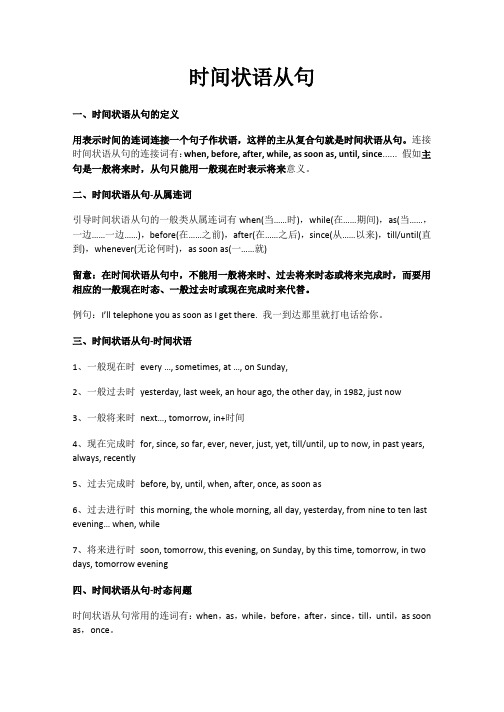
时间状语从句一、时间状语从句的定义用表示时间的连词连接一个句子作状语,这样的主从复合句就是时间状语从句。
连接时间状语从句的连接词有:when, before, after, while, as soon as, until, since...... 假如主句是一般将来时,从句只能用一般现在时表示将来意义。
二、时间状语从句-从属连词引导时间状语从句的一般类从属连词有when(当……时),while(在……期间),as(当……,一边……一边……),before(在……之前),after(在……之后),since(从……以来),till/until(直到),whenever(无论何时),as soon as(一……就)留意:在时间状语从句中,不能用一般将来时、过去将来时态或将来完成时,而要用相应的一般现在时态、一般过去时或现在完成时来代替。
例句:I’ll telephone you as soon as I get there. 我一到达那里就打电话给你。
三、时间状语从句-时间状语1、一般现在时every …, sometimes, at …, on Sunday,2、一般过去时yesterday, last week, an hour ago, the other day, in 1982, just now3、一般将来时next…, tomorrow, in+时间4、现在完成时for, since, so far, ever, never, just, yet, till/until, up to now, in past years, always, recently5、过去完成时before, by, until, when, after, once, as soon as6、过去进行时this morning, the whole morning, all day, yesterday, from nine to ten last evening… when, while7、将来进行时soon, tomorrow, this evening, on Sunday, by this time, tomorrow, in two days, tomorrow evening四、时间状语从句-时态问题时间状语从句常用的连词有:when,as,while,before,after,since,till,until,as soon as,once。
状语从句知识点详解(初中英语专项复习)14

状语从句知识点详解(初中英语专项复习)状语从句的概念: 用一个句子作状语来修饰动词和形容词,以表明动作发生或状态存在的时间、地点、原因等,这个句子就叫做状语从句。
状语从句的分类:状语从句共分为九大类,包括:时间、地点、原因、条件、让步、目的、结果、方式、比较状语从句。
下面分别讲解:一、时间状语从句概念:用来表示时间的状语从句,由when, while, as, till, until,before, after, since等引导。
由于时间状语从句的引导词所表示的意思并非一致,不同引导词表达不同的时间,它们在句子中对应的时态、语态等也有所不同。
例如:when /while引导的时间状语从句when引导的从句的谓语动词通常是瞬间动词,也可以是延续性动词。
从句动作可与主语动作通常先后发生也可同时发生。
I was writing when my sister came back.( come是瞬间动词,只能用when引导,不能用while)He often wrote me when/while he studied in Shanghai International Studies University.( study 是延续性动词,while可代替when)While my mother was cooking , I was playing chess with dad. (cook是延续性的动词,cook和play同时发生)I like playing chess while my sister likes reading stories.我喜欢下棋,而我姐姐喜欢看小说。
(while表示对比)when和while的区别还有:while引导的时间状语从句多用于进行时态,而when引导的时间状语从句多用于一般时态。
While we were playing games, our headmaster called me .我们正在做游戏的时候,校长叫我了。
时间状语与状语从句的区别
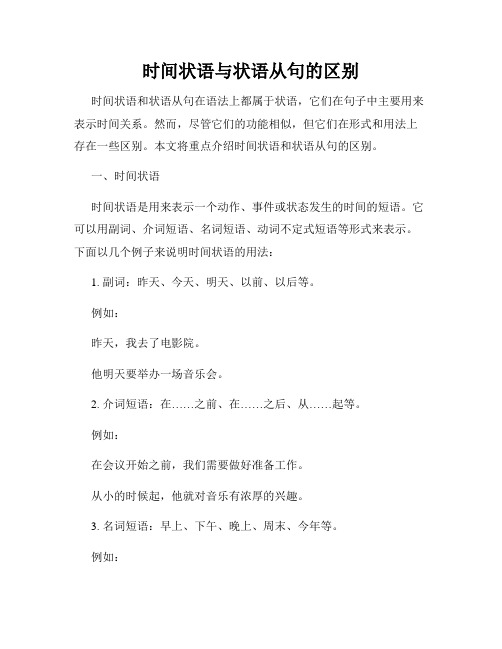
时间状语与状语从句的区别时间状语和状语从句在语法上都属于状语,它们在句子中主要用来表示时间关系。
然而,尽管它们的功能相似,但它们在形式和用法上存在一些区别。
本文将重点介绍时间状语和状语从句的区别。
一、时间状语时间状语是用来表示一个动作、事件或状态发生的时间的短语。
它可以用副词、介词短语、名词短语、动词不定式短语等形式来表示。
下面以几个例子来说明时间状语的用法:1. 副词:昨天、今天、明天、以前、以后等。
例如:昨天,我去了电影院。
他明天要举办一场音乐会。
2. 介词短语:在……之前、在……之后、从……起等。
例如:在会议开始之前,我们需要做好准备工作。
从小的时候起,他就对音乐有浓厚的兴趣。
3. 名词短语:早上、下午、晚上、周末、今年等。
例如:早上,我会去健身房锻炼。
他今年已经去了好几个国家旅行。
二、状语从句状语从句是由一个连词引导的句子,表示一个动作、事件或状态发生的时间,它和主句之间是一种从属关系。
常见的时间状语从句引导词有:when、while、before、after、since、until等。
下面以几个例子来说明状语从句的用法:1. 引导词when:当……时候、在……时间等。
例如:当我看到她的时候,她正在做作业。
在我吃早饭的时候,她已经离开了。
2. 引导词while:在……期间、当……的时候等。
例如:我喜欢听音乐,而他则喜欢看电视。
当我在打扫房间的时候,他正在做饭。
3. 引导词before和after:在……之前、在……之后等。
例如:在他来之前,我已经离开了。
她已经吃完晚饭后,才开始看电视。
三、时间状语与状语从句的区别时间状语和状语从句在形式和用法上存在一些区别。
1. 形式上的区别:时间状语通常是一个短语或者一个词,例如副词、介词短语、名词短语等。
而状语从句是一个完整的句子,由一个引导词和一个主句构成。
2. 位置上的区别:时间状语可以出现在句子的任何位置,可以放在句首、句中或句末。
而状语从句通常放在主句之后,或者主句的中间。
状语从句的用法(基础讲解)

状语从句的用法【概念引入】1. 状语从句名言:(1)时间状语从句As soon as man is born,he begins to die.出生之时,死亡之始。
Life is half spent before we know what it is.在我们知道生活是什么时,生活已经过去一半了。
(2)地点状语从句Where there is great love,there are always miracles.哪里有伟大的爱,哪里就有奇迹。
(3)原因状语从句Some people will never learn anything,because they understand everything too soon.有些人绝不能学到什么东西,因为,他们对任何东西都懂得太快。
(4)条件状语从句If winter comes,can spring be far behind?冬天来了,春天还会远吗?(5)让步状语从句A liar is not believed even though he tells the truth.说谎者即使在说实话时也没人相信。
2. 状语从句定义:用一个句子(从句)来作另一个句子(主句)的状语,用作状语的句子就叫作状语从句。
作什么样的状语就叫什么类型的状语从句。
引导状语从句的连接词是从属连词,状语从句可以放在句首,也可以放在句尾。
状语从句的类型主要有:时间状语从句、地点状语从句、原因状语从句、结果状语从句、目的状语从句、条件状语从句及比较状语从句等。
【用法讲解】1. 时间状语从句:时间状语从句在主句中表示时间,常用连接词有:when(当……时),while(当……时),as(当……时),before(在……之前),after(在……之后),since(自从),not…until(直到……才),as soon as(一……就),once(一旦……就)等。
例如:I didn’t go to bed until I finished my homework. 我直到做完作业才去睡觉。
状语从句和时间状语的关系及其在句子中的运用
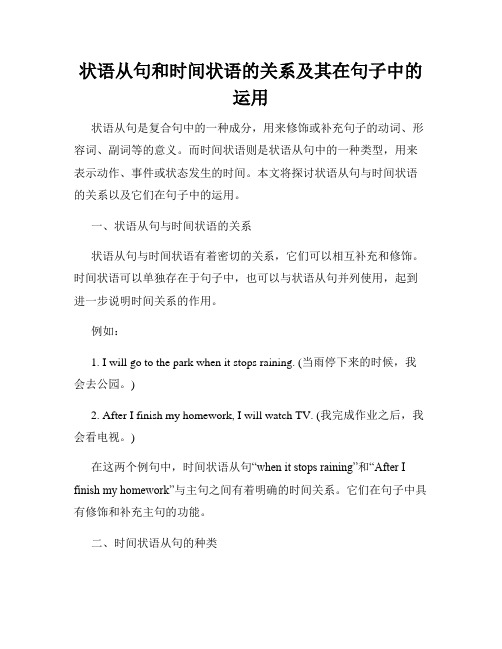
状语从句和时间状语的关系及其在句子中的运用状语从句是复合句中的一种成分,用来修饰或补充句子的动词、形容词、副词等的意义。
而时间状语则是状语从句中的一种类型,用来表示动作、事件或状态发生的时间。
本文将探讨状语从句与时间状语的关系以及它们在句子中的运用。
一、状语从句与时间状语的关系状语从句与时间状语有着密切的关系,它们可以相互补充和修饰。
时间状语可以单独存在于句子中,也可以与状语从句并列使用,起到进一步说明时间关系的作用。
例如:1. I will go to the park when it stops raining. (当雨停下来的时候,我会去公园。
)2. After I finish my homework, I will watch TV. (我完成作业之后,我会看电视。
)在这两个例句中,时间状语从句“when it stops raining”和“After I finish my homework”与主句之间有着明确的时间关系。
它们在句子中具有修饰和补充主句的功能。
二、时间状语从句的种类时间状语从句根据表达的时间关系可以分为几类,包括:表示时间点的从句、表示时间段的从句、表示时间顺序的从句以及表示条件的从句等。
1. 表示时间点的从句表示时间点的从句用来说明某个动作或事件发生的具体时间。
它通常使用一些连词或词组引导,如when、while、once、before、after等。
例如:- We will have a meeting after he arrives. (他到达后我们将召开会议。
) - Once you finish your work, you can go home. (你完成工作之后可以回家。
)2. 表示时间段的从句表示时间段的从句用来说明某个动作或事件发生的一段时间。
它通常使用一些连词或词组引导,如while、as、since、as long as、as soon as等。
高考状语从句讲解
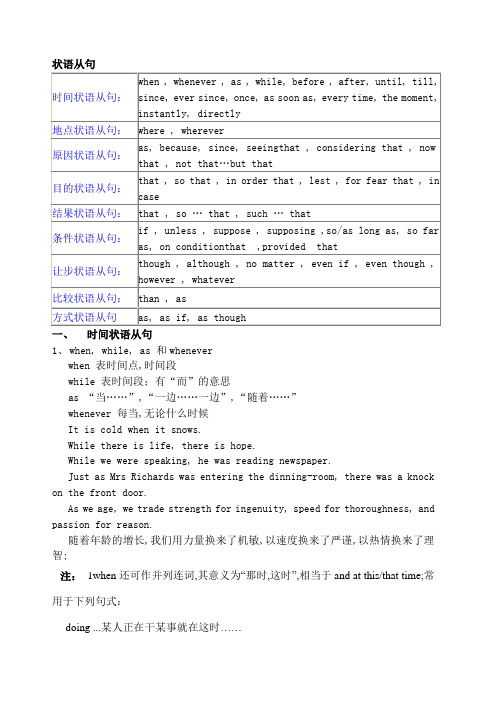
状语从句时间状语从句:when , whenever , as , while, before , after, until, till, since, ever since, once, as soon as, every time, the moment, instantly, directly地点状语从句:where , wherever原因状语从句:as, because, since, seeingthat , considering that , now that , not that…but that目的状语从句:that , so that , in order that , lest , for fear that , in case结果状语从句:that , so … that , such … that条件状语从句:if , unless , suppose , supposing ,so/as long as, so far as, on conditionthat ,provided that让步状语从句:though , although , no matter , even if , even though , however , whatever比较状语从句:than , as方式状语从句as, as if, as though一、时间状语从句1、when, while, as 和wheneverwhen 表时间点,时间段while 表时间段;有“而”的意思as “当……”,“一边……一边”,“随着……”whenever 每当,无论什么时候It is cold when it snows.While there is life, there is hope.While we were speaking, he was reading newspaper.Just as Mrs Richards was entering the dinning-room, there was a knock on the front door.As we age, we trade strength for ingenuity, speed for thoroughness, and passion for reason.随着年龄的增长,我们用力量换来了机敏,以速度换来了严谨,以热情换来了理智;注:1when还可作并列连词,其意义为“那时,这时”,相当于and at this/that time;常用于下列句式:doing ...某人正在干某事就在这时……about to/ going to do ...某人正打算干某事就在这时……has just done ...某人刚干了某事就在这时……2如果主句表示的是短暂动作,而从句用延续性动词的进行时态表示在一段时间内正在进行的动作时,when,while与as可互换使用;如:When/While/As I was walking down the street,I came across an old friend of mine.2、before/ afterIt will be five years before we meet again.五年之后我们才能见面;After you think it over, please let me know what you decide.After her husband had gone to work, she sent her children to school.3、until, till, not...until1)肯定句:主句的谓语是延续性动词,主从句均为肯定式,意为“某动作一直持续到某时间点才停止”Please wait until I come back.等我回来;2)否定句:主句的谓语是非延续性动作,从句为肯定式,意为“某动作一直到时间点才开始”He won’t go to be d till/until she returns.3)Till不可以用在句首,而until可以Until you told me I had no idea of it.4not…until句型中的强调和倒装用法It was not until you told me that I had any idea of it.Not until you told me did I have any idea if it.4、since从句谓语动词多用于一般过去时态,主句用现在完成时态或现在完成进行时态She has been working in this factory since she left school.I have written to Alice four times since I came here.It is +一段时间+since从句的句型中,时间计算一律从since从句动作完成或状态结束时算起It is three years since the war broke out. 战争爆发以来,有三年了;It is three years since she was in our class.她离开我们班有三年了;5、as soon as, immediately, directly, instantly, the moment/ minute/instant/ secondno sooner…than…, hardly/scarcely/barely…when…,“一……就”once一旦The moment I heard the voice, I know father was coming.Directly I had done it, I knew I hold made a mistake.The instant he saw me, he ran away.I had hardly got home when it began to rain.hardly/no sooner主句用过去完成时,when/than引导的从句用一般过去时,固定结构No sooner had we arrived at the station than the train left.6、by the time到……时候;到……之前从句用一般过去时,主句用过去完成时each/every time和the next timeBy the time I got outside, the bus had already left.Each time she came, Jane brought me a nice book.二、地点状语从句where或wherever/ anywhere/ everywhere1.Stay where you are.2.The photo of mine was taken where stood the famous high tower.3.Wherever you go, you can see new factories and stories.4.Everywhere you go, you will find the same thing.5.Where there is a will, there is a way.6.Plants will grow almost anywhere there is plenty of air, water andsunlight.判断:You’d better make a mark where you have questions.You’d better make a mark at the place where you have questions. 三、原因状语从句because/as由于/for/since既然/now that/seeing that/considering that…1)because强调原因,是句子较重要的部分,在很多情况下,不能用since,for 等替代;Henry didn’t go to the office because it was rain ing.He resigned partly because he was old and partly because he was bored with the work.I didn’t help, not because I was unwilling, but because I was unableto do it.2)as和since所提出的原因是已知的,或是句中不重要的部分,since较as 稍正式一些As his fat is in a large town, he has no garden of his own.Since you don’t trust him, you should not employ him.3)for,一种补充说明,而且for引导的句子不能放在句首,for是并列连词He seldom goes out now, for he is very old.4)not that…but that...“不是因为……而是因为……”It’s not that I’m dissatisfied, but that I have my own business to attend to.5 in that多出现主句之后;seeing that因为,鉴于;considering that因为,考虑到I like this place, but I like my hometown better in that I have more friends there.Seeing that/ since he was there, he may have seen her.That is excusable considering/ seeing that he is so young四、条状语从句1)真实条件从句:属性,习惯,推测,对未来的预测If you heat ice, it melts.If he is in London, he is undoubtedly staying at this hotel.If businessmen want to borrow money, they go to see their bank managers.If he breaks his promise, she’ll never speak to him again.2 非真实条件句:虚拟语气3if only引导状语从句,要用虚拟语气,“但愿,要……就好了”If only I had more money, I could buy a car. 对现在情况表示遗憾If only I had known it, I wouldn’t have troubled him. 对过去情况表示遗憾only if 只有,用陈述语气You’ll succeed only if you put all your heart into it.4 provided/ providing that“在……条件下”,“要是”,“以……为条件”on condition thatunder the condition thatsuppose/ supposing that“假定”,主句多是疑问句granted/ granting that “假定…….”,“就算是”,有浓厚的让步意义,可意为“姑且”given that…“假设”主要强调以假定的方式提出前提条件;I will come providing that I am well enough.I will go there on the condition that you accompany me.Supposing he can’t come, who will do the workGranted that you have made some progress, you should not be conceited. Given that this is true, what should we do5 as/ so long as… “只要”重点在于时间的延续性,从句可用现在时表将来;You may borrow this book as long as you keep it clean.6 unless“除非”,相当于“if…not…”,引导的从句不能用否定式I will go there tomorrow unless it rains.五、方式状语从句as “如,像”;as if=as though “好像,仿佛……似的”I live as others do.He looks as if he is angry.六、让步状语从句1、though, although, while, whereas, even if, even though “虽然,尽管”Though和 although两者意思相同,一般可互换使用,都可以与yet,still或nevertheless连用,但不能和but连用;Though/ Although it was raining hard, yet they went on playing football.Though I believe it, yet I must consider.While I like the style of the hat, I don’t like its color.强调对比和差异He thought I was lying, whereas I was telling the truth.Even though I were starving,I would not ask a favor of him.“即使”,有一种假想的可能性或推测,所以用虚拟语气2、whether…or not“不管……”Whether he comes or not, the results will be the same.3、whatever=no matter what, whichever=no matter whichWhoever, whomever, whosever, whenever, wherever, howeverStay calm whatever happens.Whenever he comes, he brings us some parents.Whichever side wins, I shall be satisfied.4、as, though, thatas引导的让步状语从句需要倒装Poor though he is, he is generous.Child that he was, he knew what was the right thing to do.Strange as this behavior may be, there is a very good reason for it. Try as he will, he never seems able to succeed.七、结果状语从句so+ adj./adv. +.that从句so+ adj.+a/an + 可数名词单数+that从句so many/ few/ much/ little +名词 + that从句such + a/an + adj. + 可数名词单数+ that从句such + adj. +可数名词复数/不可数名词 + that 从句such + a lot of/ lots of + 名词+that 从句The wind was so strong that he would hardly move forward.We have such difficult problems that no one would like to solve.He is such a lovely child that everybody loves him.He gave me so little time that it was impossible for me to finish the work on time.There are so many picture-story books that the boy won’t leave.so thatHe works hard every day, so that he gets the first prize in class.注意:当so或such置于句首,主句要用倒装语序;So clever a student was he that he was able to work out all the difficult problems.八、目的状语从句so that, in order that, to the end thatI stepped aside so that he would go in.lest, in case “免得,以免” ; for fear that,生怕She took the umbrella lest it should rain.There is some money in case you need it.Mary didn’t want get out of bed for fear that she might wake her baby up.九、比较状语从句as…as, not as/so…as, the same…as, such…as 和……一样more…than…, less…than…,the +比较级, the+比较级,This suggestion is as good as that one.Tom is as good a student as Jack =Tom is such a good student as Jack.The sooner, the better.More haste, less speed.在比较级中要,注意比较的对象要一致The weather in Shanghai is hotter than that in Beijing.The students in my class are more than those in yours.表达倍数, 可用三种形式This building is once taller than that one.This building is twice as tall as that one.This building is twice the height of that one.状语从句中的紧缩现象1 时间状语从句中常见的紧缩形式:Don’t speak until spoken to 有人对你说话时你才说;Once seen, it can never be forgotten. 一旦被看见,它便不会被忘记;While in Beijing, I paid a visit to the Summer Place. 在北京时,我参观了颐和园;Pressure can be reduced when needed. 必要时压力非唯心减;I prefer my milk a little sweet whenever possible.可能的话,我喜欢牛奶甜点;He was a swimmer when a child. 他小时侯就是一名游泳运动员;She always sings while doing her work. 她干活时总唱歌;2 条件状语从句中常见的紧缩形式:Come tomorrow if possible. 可能的话就明天来吧If so, you must get back and get it. 如果这样的话,你必需把它拿来;I’ll buy a TV set if necessary. 如有必要我们就买一台电视机;He has no money, if any, he will give us. 他没有钱,如果有他会给我们的;If in need, don’t hesitate to ask me for money.如要钱,不必犹豫,向我要就是了;The girl never give in unless wrong. 这女孩不会屈服的,除非她错了;Unless repaired, the machine is of no use. 这台机器如不修便毫无用处;3 方式状语从句中常见的紧缩形式:Some flowers shut up at night as if they did this in order to sleep.有些花夜间收拢,好象为了睡眠一样;The woman teacher hurriedly left the classroom as though she was angry.这位女教师匆匆茫茫离开教室,好象生气了;Jane seemed as if she was good at everything.琼好象擅长一切;4 其它状语从句的紧缩形式:Though cold, he still wore a shirt. 天气虽然冷,但他还穿一件衬衣;The man, while he is well over eighty. Can walk faster than I .这人虽然年过八十,却比我走得快;Being blind= As he was blind, he couldn’t see anything.他瞎了,什么东西也看不见;Fill in the blank with articles where necessary.在需要的地方填上冠词;真题演练1 2012全国卷I25. I don't believe we've met before, _______ I must say youdo look familiar.A. thereforeB. althoughC. sinceD. unless2 2012全国卷I29. This restaurant wasn't _______ that other restaurant we went to.A. half as good asB. as half good asC. as good as halfD. good as half as3 2012全国卷II11. I had hardly got to the office ___ my wife phone me togo back home at once.A. whenB. thanC. untilD. after4 2012北京卷21.—Look at those clouds—Don’t worry. ______ it rains, we’ll still have a great time.A. Even if though C. In case D. If only5 2012上海卷 32. I have a tight budget for the trip, so I'm not going tofly the airlines lower ticket prices.A. onceB. ifC. afterD. unless6 2012上海卷 40. The map is one of the best tools a man has he goesto a new place.A. wheneverB. whateverC. whereverD. however7 2012天津卷14. Everything was placed exactly ___________he wanted it for the graduation ceremony.A. whileB. whenC. whereD. though8 2012江苏卷30. One’s life has value ________ one brings value to the life of others.A. so thatB. no matter howC. as long asD. except that9 2012湖南卷28. ________ I always felt I would pass the exam, I never thought I would get an A.A. WhileB. OnceC. IfD.Until10 2012湖南卷32. ________ hard you try, it is difficult to lose weight without cutting down the amount you eat.A. HoweverB. WhateverC. WhicheverD. Whenever11 2012福建卷 is hard for the Greek government to get over the presentdifficulties ____ it gets more financial support from theEuropean Union.A. ifB. unlessC. becauseD. since12 2012陕西卷18. Hot _______ the night air was, we slept deeply because we were so tired after the long journey.A. althoughB. asC. whileD. however13 2012陕西卷25. All the photographs in this book, _______ stated otherwise, date from the 1950s.A. unlessB. untilC. onceD. if14 2012山东卷27. He smiled politely ______ Mary apologized for her drunkenfriends.A. asB. ifC. unlessD. though15 2012山东卷32. A number of high buildings have arisen _______ there wasnothing a year ago but ruins.A. whenB. whereC. beforeD. until16 2012重庆卷30. — Coach, can I continue with the training—Sorry, you can’t ________ you haven’t recovered from the knee injure.A. untilB. beforeC. becauseD. unless17 2012四川卷4. At school, some students are active ________ some are shy,yet they can be good friends with one another.A. whileB. althoughC. soD. as18 2012四川卷10. If you happen to get lost in the wild, you’d better stay________ you are and wait for help.A. whyB. whereC. whoD. what19 2012江西卷 can borrow my car you promise not to drive too fast.A.unless B.even if C.in case D.as longas20 2012浙江卷18. Mike was usually so careful, ______this time he made asmall mistake.A. yetB. stillC. evenD. thus21 2012辽宁卷30. Leave your key with your neighbor you lock yourselfout one day.A. as long asB. even thoughC. in caseD. as if2011年真题1.2011全国卷II19. It was a nice meal, _______a little expensive.A. thoughB. whetherC. asD. since2.2011北京卷29. __________ volleyball is her main focus, she’s also greatat basketball.A. SinceB. OnceC. UnlessD. While3. 2011上海卷 36. If a lot of people say a film is not good, I won’t botherto see it, or I’ll wait it comes out on DVD.A. whetherB. afterC. thoughD. until4.2011上海卷 37. The police officers in our city work hard _____ the restof us can live a safe life.A. in caseB. as ifC. in order thatD. only if5.2011江西卷29. Please call my secretary to arrange a meeting thisafternoon, or it is convenient to you.A. wheneverB. howeverC. whicheverD. wherever6.2011浙江卷4. One Friday, we were packing to leave for a weekend awaymy daughter heard cries for help.A. afterB. whileC. sinceD. when7.2011福建卷 was April 29, 2001 Prince William and Kate Middletonwalked into the palace hall of the wedding ceremony.8.2011四川卷4. Frank insisted that he was not asleep I had great difficulty in waking him up.A. whetherB. althoughC. forD. so9.2011四川卷6. As it reported, it is 100 years _____________Qinghua University was founded.A. whenB. beforeC. afterD. since10.2011辽宁卷25. No matter how ________ , it is not necessarily lifeless.A. a desert may be dryB. dry a desert may beC. may a desert be dryD. dry may a desert be11.2011辽宁卷29. He had no sooner finished his speech _____ the students started cheering.A. sinceB. asC. whenD. than12.2011陕西卷 new stadium being built for the next Asian Games will be______the present one.A. as three times big asB. three times as big asC. as big as three timesD. as big three times as13.2011天津卷5. reg ular exercise is very important, it’snever a good idea to exercise too close to bedtime.B. As14.2011陕西卷 of them are strong candidates, only one will be chosen forthe post.A. SinceB. WhileC. IfD. As15.2011重庆30 Toshowourrespect,weusuallyhavetotakeourglovesoff weareto shakehandswith.16. 2011湖南卷33Jackwasn’tsayinganything,buttheteachersmiledathim_______hehaddonesomethingveryclever.17. 2011山东卷28Hehadhiscameraready_____hesawsomethingthatwouldmakeagoodpicture.A.evenifB.ifonlyC.incaseD.sothat。
状语的具体讲解(二)时间状语
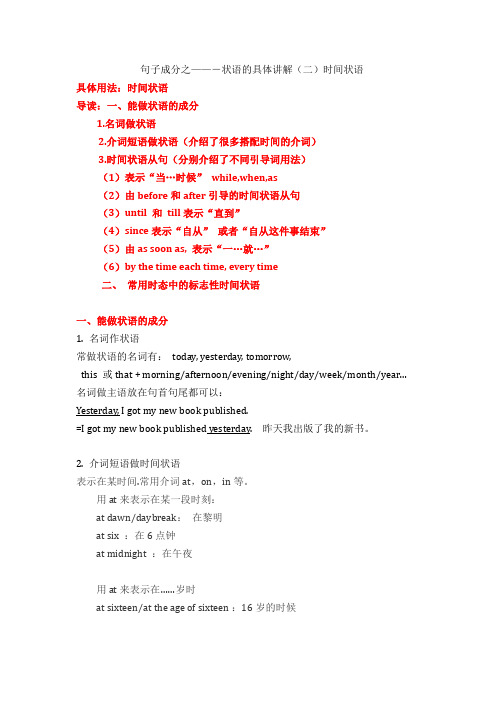
句子成分之——-状语的具体讲解(二)时间状语具体用法:时间状语导读:一、能做状语的成分1.名词做状语2.介词短语做状语(介绍了很多搭配时间的介词)3.时间状语从句(分别介绍了不同引导词用法)(1)表示“当…时候”while,when,as(2)由before和after引导的时间状语从句(3)until 和till表示“直到”(4)since表示“自从”或者“自从这件事结束”(5)由as soon as, 表示“一…就…”(6)by the time each time, every time二、常用时态中的标志性时间状语一、能做状语的成分1. 名词作状语常做状语的名词有:today, yesterday, tomorrow,this 或that + morning/afternoon/evening/night/day/week/month/year…名词做主语放在句首句尾都可以:Yesterday, I got my new book published.=I got my new book published yesterday.昨天我出版了我的新书。
2. 介词短语做时间状语表示在某时间.常用介词at,on,in等。
用 at 来表示在某一段时刻:at dawn/daybreak:在黎明at six :在6点钟at midnight :在午夜用 at 来表示在……岁时at sixteen/at the age of sixteen :16岁的时候用 on 来表示在星期几/某日on Monday :在星期一on January fifth:在1月5日on Christmas Day :在圣诞节那一天也可用at Christmason New Year's Day:在新年那天用in来表示一天中的早中晚,月份,季节或年份in the morning/afternoon/evening在早晨,下午,晚上in January/February在一月,二月in Spring在春天in 2014在2014年表示期间常用介词during,for,over,within,throughout,from和to等。
时间状语从句知识点讲解
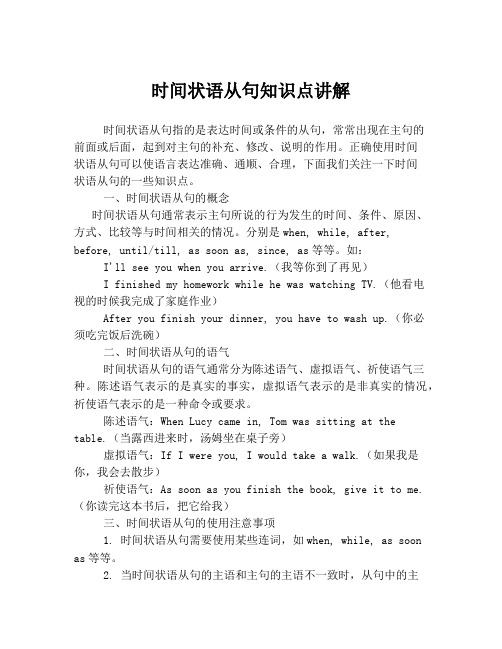
时间状语从句知识点讲解时间状语从句指的是表达时间或条件的从句,常常出现在主句的前面或后面,起到对主句的补充、修改、说明的作用。
正确使用时间状语从句可以使语言表达准确、通顺、合理,下面我们关注一下时间状语从句的一些知识点。
一、时间状语从句的概念时间状语从句通常表示主句所说的行为发生的时间、条件、原因、方式、比较等与时间相关的情况。
分别是when, while, after, before, until/till, as soon as, since, as等等。
如:I'll see you when you arrive.(我等你到了再见)I finished my homework while he was watching TV.(他看电视的时候我完成了家庭作业)After you finish your dinner, you have to wash up.(你必须吃完饭后洗碗)二、时间状语从句的语气时间状语从句的语气通常分为陈述语气、虚拟语气、祈使语气三种。
陈述语气表示的是真实的事实,虚拟语气表示的是非真实的情况,祈使语气表示的是一种命令或要求。
陈述语气:When Lucy came in, Tom was sitting at the table.(当露西进来时,汤姆坐在桌子旁)虚拟语气:If I were you, I would take a walk.(如果我是你,我会去散步)祈使语气:As soon as you finish the book, give it to me.(你读完这本书后,把它给我)三、时间状语从句的使用注意事项1. 时间状语从句需要使用某些连词,如when, while, as soon as等等。
2. 当时间状语从句的主语和主句的主语不一致时,从句中的主语必须与主句中的某个单词有关联。
通常使用指示代词,如this, that, these, those等。
状语从句讲解
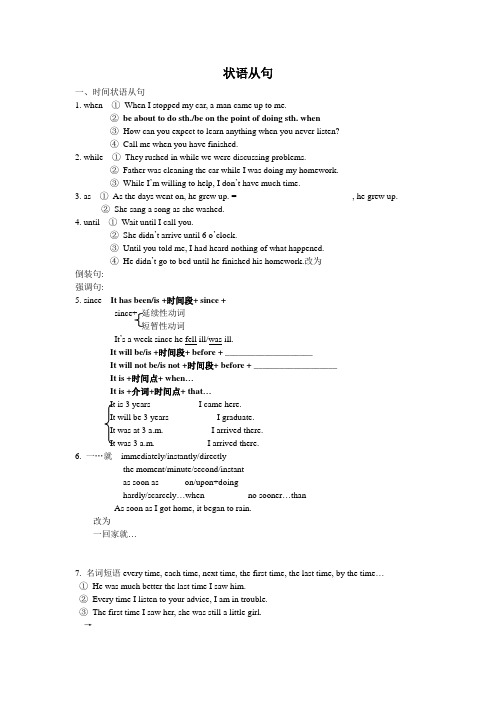
状语从句一、时间状语从句1. when ①When I stopped my car, a man came up to me.②be about to do sth./be on the point of doing sth. when③How can you expect to learn anything when you never listen?④Call me when you have finished.2. while ①They rushed in while we were discussing problems.②Father was cleaning the car while I was doing my homework.③While I’m willing to help, I don’t have much time.3. as ①As the days went on, he grew up. = __________________________, he grew up.②She sang a song as she washed.4. until ①Wait until I call you.②She didn’t arrive until 6 o’clock.③Until you told me, I had heard nothing of what happened.④He didn’t go to bed until he finished his homework.改为倒装句:强调句:5. since It has been/is +时间段+ since + ___________________since+ 延续性动词__________________短暂性动词__________________It’s a week since he fell ill/was ill.It will be/is +时间段+ before + ____________________It will not be/is not +时间段+ before + ___________________It is +时间点+ when…It is +介词+时间点+ that…It is 3 years __________ I came here.It will be 3 years __________ I graduate.It was at 3 a.m. __________ I arrived there.It was 3 a.m. ___________ I arrived there.6. 一…就immediately/instantly/directlythe moment/minute/second/instantas soon as on/upon+doinghardly/scarcely…when no sooner…thanAs soon as I got home, it began to rain.改为_________________________________________________________一回家就…7. 名词短语every time, each time, next time, the first time, the last time, by the time…①He was much better the last time I saw him.②Every time I listen to your advice, I am in trouble.③The first time I saw her, she was still a little girl.→④By the time he arrived, the lecture had ended.二、地点状语从句常由where, wherever引导1. Where there is a will, there is a way.2. Wherever the sea is, you will find seamen.3. There are plenty of trees ___________ I live.in the place ____________ I live.三、原因状语从句because 表直接原因,可以回答why的提问,也可以用于强调句中,不能与so连用as, since 通常表已知原因since常位于句首for 只能位于主句之后,用来补充说明1. -- Why did you go to the town yesterday? -- Because I wanted to see my uncle.改为强调句:2. Since everyone is here, let’s get started.3. Let’s stay at home for it’s raining hard outside.4. Now that you understand, I don’t need to explain it again.5. I like the city, but I prefer the country in that there’s fresher air.四、目的状语从句常由so that, in order that引导,从句中常与情态动词can, could, may, might…连用,可以与so as (not) to do, in order (not) to do转换1. I got up early so that I could catch the first bus.He got up so early that he caught the first bus.2. You must speak louder so that/in order that you can be heard by others.转换:五、结果状语从句常由so…that, such…that引导so + adj./adv. such + n. so much/many/few/littleso + adj. + a/an + n. such + a/an + adj. + n. such + adj. +n.(pl.)/[U]n.so fine a day →_______________________ →_______________________He is so young that he can’t go to school.改为倒装句:六、条件状语从句常由if, on condition that, provided/providing/supposing/suppose that, unless, as/so long as…引导, 主将从现1. Let’s go out for a walk unless you are tired. →If you are not tired, let’s go out for a walk.2. I can tell you the truth on condition that you promise to keep it a secret.七、让步状语从句1. although, though 不能与but连用,可与yet, still连用①Although it’s raining, they’re still working in the field.②They kept on working, though it was raining.③I’ve a bit of headache. It’s nothing serious, though.④Our team lost. I t’s a good game, though.2. even if/though 即使①I’ll make a trip even if the weather is bad.②Native English speakers can understand each other even if they don’t speak the same.3. whether…(or not) Whether you believe it or not, it’s true.4. wh-ever = no matter + wh-①Whatever happened, he didn’t mind.②I’ll wait for you however late it is.③Whoever comes will be welcome.5. as引导让步状语从句必须倒装(表语,状语,谓语中的实义动词前置构成倒装)①Child as he is, he knows a lot.②Young as he is,③Hard as he works, he makes little progress.④Much as I respect him, I can’’ agree to his proposal.⑤Try as you may, you will not succeed.⑥Object as you may, I’ll go.八、方式状语从句1. as 如同,正如Do as the Romans do.A is toB whatC is to D. Air is to man what water is to fish.2. as if/though 仿佛,好像①It looks as if the weather may pick up soon.②He talks as if he knew where she was.③The girl listened as if she had been turned to stone.④He opened his mouth as if he would say something.⑤He stared at me as if seeing me for the first time.⑥He cleared his throat as if to say something⑦Look out for cars when crossing the street.⑧Even if (I’m) invited, I won’t go to the party.九、比较状语从句常由than, as…as, not as/so…as引导①He speaks English as well as you (do).②He doesn’t speak English so/as well as you (do).③He is more successful than I expected.④The more you exercise, the healthier you’ll be.Exercise:1. John shut everybody out of the kitchen __________ he could prepare his grand surprise for the party. A. which B. when C. so that D. as if2. After the war, a new school building was put up ________ there had once been a theatre.A. thatB. whereC. whichD. when3. -- Is Mr. Smith in the office? -- Yes, ________ he is in charge of the office, he must be there.A. sinceB. howeverC. whetherD. for4. John may phone tonight. I don’t want to go out __________ he phones.A. as long asB. in order toC. in caseD. so that5. Someone called me up in the middle of the night, but they hung up __________ I could answer the phone. A. as B. since C. until D. before6. -- Don’t look down upon Bob. He has his own advantages.-- Oh, yes. _________ others are weak, he is strong.A. IfB. WhenC. WhereD. Though7. It is ten years _________ he smoked.A. thatB. whenC. sinceD. while8. We must hurry up __________ catch up with the last train.A. so thatB. soC. in order thatD. in order to9. ___________ you are so weak, you’d better stay at home.A. SinceB. ForC. BecauseD. Though10. ___________ you talk to someone or write a message, you show your skills to others.A. At timesB. Some timeC. By the timeD. Every time11. Although he is considered a great writer, _________________.A. however his works are not widely readB. but his works are not widely readC. his works are not widely readD. still his works are not widely read12. We should finish the important job, ______________.A. long it takes howeverB. it takes however longC. long however it takesD. however long it takes13. Why do you want to find a new job __________ you’ve got such a good one already?A. thatB. whereC. whichD. when14. You should make it a rule to leave things __________ you can find them again.A. whenB. whereC. thenD. there15. He got excited at the news, __________ I was calm.A. whenB. whileC. becauseD. after16. -- Shall Brown come and play computer games?-- No, _________ he has finished his homework.A. whenB. ifC. unlessD. once17. Hardly had he arrived in Hongkong __________ she rang me up.A. whenB. thanC. thenD. and18. __________ they heard the shout for help, they rushed out.A. ImmediatelyB. The momentC. The minuteD. All above19. _____________, he never seems able to do the work beautifully.A. Try as he doesB. as he triesC. Try as does heD. As he does try20. -- The air is full of smoke and people are coughing.-- It will get worse ___________ the government does something about the pollution.A. butB. unlessC. exceptD. if21. We’ll never give in __________ they might do or say about our plan.A. no matter howB. howC. whateverD. although22. If you go to Xi’an, you will find the places there more magnificent than commonly ________.A. supposingB. supposedC. to supposeD. suppose23. It’s no wonder you’ve got a headache ___________ you drank so much last night.A. thoughB. in caseC. whenD. while24. I wonder if I _________ time. If I _________ time, I’ll go with you.A. have; haveB. will have; will haveC. have; will haveD. will have; have25. By the time you __________ back, the supper __________ ready.A. will get; will beB. get; wasC. get; will beD. will get; is26. _____________ I live, I will never give in to the enemy.A. as far asB. As long asC. As well asD. As soon as27. I was about to leave my house ___________ the phone rang.A. whileB. whenC. asD. after28. I had cut the meat into pieces ____________ Mother started cooking.A. whenB. as soon asC. afterD. while。
状语的具体讲解(二)时间状语
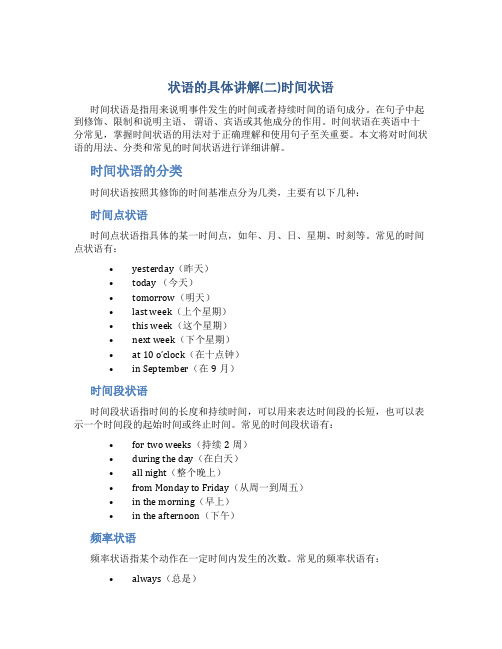
状语的具体讲解(二)时间状语时间状语是指用来说明事件发生的时间或者持续时间的语句成分。
在句子中起到修饰、限制和说明主语、谓语、宾语或其他成分的作用。
时间状语在英语中十分常见,掌握时间状语的用法对于正确理解和使用句子至关重要。
本文将对时间状语的用法、分类和常见的时间状语进行详细讲解。
时间状语的分类时间状语按照其修饰的时间基准点分为几类,主要有以下几种:时间点状语时间点状语指具体的某一时间点,如年、月、日、星期、时刻等。
常见的时间点状语有:•yesterday(昨天)•today (今天)•tomorrow(明天)•last week(上个星期)•this week(这个星期)•next week(下个星期)•at 10 o’clock(在十点钟)•in September(在9月)时间段状语时间段状语指时间的长度和持续时间,可以用来表达时间段的长短,也可以表示一个时间段的起始时间或终止时间。
常见的时间段状语有:•for two weeks(持续2周)•during the day(在白天)•all night(整个晚上)•from Monday to Friday(从周一到周五)•in the morning(早上)•in the afternoon(下午)频率状语频率状语指某个动作在一定时间内发生的次数。
常见的频率状语有:•always(总是)•often(经常)•seldom(很少)•never(从来不)•once a week(一周一次)•twice a month(一个月两次)时间状语的位置一般情况下,时间状语位于句子的开头或结尾,但有时也可以插入句子的中间部分。
具体位置根据上下文而定,需要根据意义而灵活安排。
下面是一些例句,展示时间状语在句子中的位置和用法:•I went to the cinema yesterday.(我昨天去看电影了。
)•Last week I went on a business trip to Beijing. (上个星期我去了北京出差。
状语从句和时间状语的复合运用
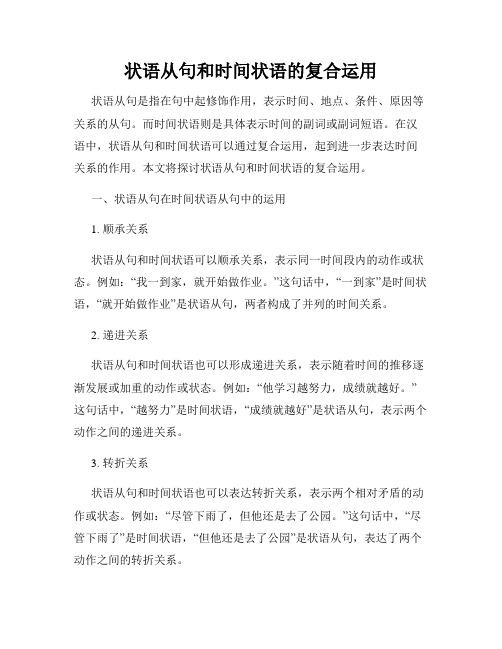
状语从句和时间状语的复合运用状语从句是指在句中起修饰作用,表示时间、地点、条件、原因等关系的从句。
而时间状语则是具体表示时间的副词或副词短语。
在汉语中,状语从句和时间状语可以通过复合运用,起到进一步表达时间关系的作用。
本文将探讨状语从句和时间状语的复合运用。
一、状语从句在时间状语从句中的运用1. 顺承关系状语从句和时间状语可以顺承关系,表示同一时间段内的动作或状态。
例如:“我一到家,就开始做作业。
”这句话中,“一到家”是时间状语,“就开始做作业”是状语从句,两者构成了并列的时间关系。
2. 递进关系状语从句和时间状语也可以形成递进关系,表示随着时间的推移逐渐发展或加重的动作或状态。
例如:“他学习越努力,成绩就越好。
”这句话中,“越努力”是时间状语,“成绩就越好”是状语从句,表示两个动作之间的递进关系。
3. 转折关系状语从句和时间状语也可以表达转折关系,表示两个相对矛盾的动作或状态。
例如:“尽管下雨了,但他还是去了公园。
”这句话中,“尽管下雨了”是时间状语,“但他还是去了公园”是状语从句,表达了两个动作之间的转折关系。
二、时间状语在状语从句中的运用1. 时间状语修饰时间状语从句时间状语可以修饰状语从句,进一步细化时间的表达。
例如:“明天,当我去上学时,他已经到校了。
”这句话中,“明天”是时间状语,“当我去上学时”是状语从句,时间状语修饰了状语从句,表示两个动作发生的时间。
2. 时间状语修饰条件状语从句时间状语还可以修饰条件状语从句,表示时间先于条件的发生。
例如:“如果你来得及,明天一起去购物吧。
”这句话中,“如果你来得及”是条件状语从句,“明天”是时间状语,时间状语修饰条件状语从句,表示了时间先于条件的发生。
3. 时间状语修饰目的状语从句时间状语还可以修饰目的状语从句,表示时间先于目的的实现。
例如:“为了明天考试,我将今晚熬夜复习。
”这句话中,“为了明天考试”是目的状语从句,“今晚”是时间状语,时间状语修饰目的状语从句,表示时间先于目的的实现。
(完整版)状语从句讲解

状语从句定义:在句中作状语的从句是状语从句,修饰主句中的动词、形容词或副词等。
状语从句由从属连词引导,从属连词在句中不充当句子成分,只起连接作用,状语从句放在句首时,要用逗号,放在句尾时不用。
状语从句主要用来修饰主句或主句的谓语。
一般可分为九大类,分别表示时间、地点、原因、目的、结果、条件、让步、比较和方式。
尽管种类较多,但由于状语从句与汉语结构和用法相似,所以理解和掌握它并不难。
状语从句的关键是要掌握引导不同状语从句的常用连接词和特殊的连接词即考点。
现分别列举如下:一、时间状语从句1.when, while和as的用法(1)when既可引导一个持续动作,也可引导一个短暂性动作.when强调主从句动作的发生有先后。
如:①When he got there, the classroom had been cleaned.他到的时候,教室已打扫过了。
(主句动作发生在从句动作之前)②He went to play football when he finished his homework.做完作业后他就去踢足球了。
(主句的动作发生在从句动作之后)when可作并列连词用,相当于just then,at the time,前一分句多用进行时、be about to或be on the point of doing,表示“正在做..,就在这时发生了另外一件事”或“届时”。
如:①I was reading when he suddenly came in.②I was about to leave when the telephone rang.(2)while强调主句动作发生在从句动作所发生的时间段内,从句的动作必须是延续性动词。
如:①Strike iron while it’s still hot.②Will you please take care of my house while I was away?在这一情况下,从句的动作一定是延续性动词,如果是非延续动词,要用when。
状语及状语从句(语法加练习完整讲解)教学提纲

6.名词(短语): Wait a moment.等一会儿。 It can go all day and all night. 它能整日整夜地走。
7.状语从句: I'll write to you as soon as I get there. 我一到那儿就给你写信。 He didn't come because he had to stay at home to finish his home work. 他没来,因为他不得不留在家里完成家庭作业。
The Adverbial 状语
一、什么是状语
修饰动词、形容词、副词或整个句子,说明动作或 状态特征的句子成分,叫做状语。
1. 状语修饰动词 Silently she went away. 她悄悄地走开了。
2. 状语修饰句子 Sadly, he will not be there. 令人伤心的是,他将不会在那里了。
5. 如果句末状语太多, 可调一个(不得超过一个)到句首。 如果有时间状语,通常将时间状语放于句首。
Yesterday morning Wang Lin was drawing a horse carefully with a brush on a piece of paper in our classroom. 昨天上午王琳在我们教室里用笔细心地在一张纸上画马。
3)this 和 that 也可以作状语去修饰形容词和副词 Do I look that stupid? 我看起来有那么傻吗? I didn't think we'd get this far. 我没想到我们会走这么远。
二、什么可以作状语? 1.副词(短语): Say again.再说一遍。 Suddenly it began to rain.天突然下雨了。
状语从句的时间原因条件等用法详细讲解

状语从句的时间原因条件等用法详细讲解状语从句的时间、原因、条件等用法详细讲解状语从句是指在复合句中作为状语的从句,用来修饰、限制主句中的动作或状态。
在英语中,状语从句主要有时间、原因、条件等多种用法。
下面将详细讲解状语从句在时间、原因、条件等方面的应用。
一、时间状语从句时间状语从句是用来表示主句中的动作或状态发生的时间或顺序关系。
常见的引导时间状语从句的连词有:when(当...时候)、before (在...之前)、after(在...之后)、as soon as(一...就)、while(当...的时候)、until(直到...为止)等。
1. 当...时候当主句中的动作或状态发生时,使用连词when引导时间状语从句。
例如:I will call you when I arrive home.(当我到家的时候,我会给你打电话。
)2. 在...之前表示主句中的动作或状态发生之前,使用连词before引导时间状语从句。
例如:Please finish your homework before you go out to play.(在你出去玩之前,请先完成作业。
)3. 在...之后表示主句中的动作或状态发生之后,使用连词after引导时间状语从句。
例如:She always helps her mother after she finishes her homework.(她总是在完成作业后帮助她的妈妈。
)4. 一...就表示主句中的动作或状态一发生,立刻使用连词as soon as引导时间状语从句。
例如:He went to bed as soon as he got home.(一到家,他就去睡觉了。
)5. 当...的时候表示主句中的动作或状态正在进行时,使用连词while引导时间状语从句。
例如:She was reading a book while her brother was watching TV.(她正在读书,而她的弟弟在看电视。
- 1、下载文档前请自行甄别文档内容的完整性,平台不提供额外的编辑、内容补充、找答案等附加服务。
- 2、"仅部分预览"的文档,不可在线预览部分如存在完整性等问题,可反馈申请退款(可完整预览的文档不适用该条件!)。
- 3、如文档侵犯您的权益,请联系客服反馈,我们会尽快为您处理(人工客服工作时间:9:00-18:30)。
句子成分之——-状语的具体讲解(二)时间状语具体用法:时间状语导读:一、能做状语的成分1、名词做状语2、介词短语做状语(介绍了很多搭配时间的介词)3、时间状语从句(分别介绍了不同引导词用法)(1)表示“当…时候”while,when,as(2)由before与after引导的时间状语从句(3)until 与till表示“直到”(4)since表示“自从”或者“自从这件事结束”(5)由as soon as, 表示“一…就…”(6)by the time each time, every time二、常用时态中的标志性时间状语一、能做状语的成分1、名词作状语常做状语的名词有: today, yesterday, tomorrow,this 或that + morning/afternoon/evening/night/day/week/month/year…名词做主语放在句首句尾都可以:Yesterday, I got my new book published、=I got my new book published yesterday、昨天我出版了我的新书。
2、介词短语做时间状语表示在某时间、常用介词at,on,in等。
用 at 来表示在某一段时刻:at dawn/daybreak: 在黎明at six :在6点钟at midnight :在午夜用 at 来表示在……岁时at sixteen/at the age of sixteen :16岁的时候用 on 来表示在星期几/某日on Monday :在星期一on January fifth:在1月5日on Christmas Day :在圣诞节那一天也可用at Christmason New Year's Day:在新年那天用in来表示一天中的早中晚,月份,季节或年份in the morning/afternoon/evening在早晨,下午,晚上in January/ February在一月,二月in Spring在春天in 2014在2014年表示期间常用介词during,for,over,within,throughout,from与to等。
during/within 用来表示在一段时间内,区别就是during 可以加名词与时间,within后只能加时间。
during the Middle Ages: 在中世纪during 1942 :在1942年中during the summer(of that year):在(那一年的)夏季during his childhood :在她童年时期during two years=within two yearsfor用来表示动作或状态持续了一段时间,(要与完成时搭配)for six years :六年之久for two months :有两个月for ever :永远表示其她时间概念的介词有before,after,since,until,till,between,up to等3、时间状语从句引导时间状语从句的连词,常见的有before, after, when whil e, as, since, till, unil, as soon as 等(1)表示“当…时候”whil e,when,aswhen引导的从句的谓语动词可以就是延续性的动词,可以就是瞬时动词。
并且when有时表示“就在那时”。
例如:When she came in, I stopped eating、她进来时,我停止吃饭。
(瞬时动词) When I lived in the countrysid e, I used to carry some water for him、当我住在农村时,我常常为她担水。
(延续性的动词)While引导的从句的谓语动作必须就是延续性的,并强调主句与从句的动作同时发生(或者相对应)。
并且whil e有时还可以表示对比。
例如:While my wife was reading the newspaper, I was watching TV、(was reading就是延续性的动词,was reading与was watching同时发生) 。
I like playing football whil e you like playing basketball、我喜欢踢足球,而您喜欢打篮球。
(对比)As表示“一边……一边”,as引导的动作就是延续性的动作,一般用于主句与从句动作同时发生;as也可以强调“一先一后。
例如:We always sing as we walk、我们总就是边走边唱。
(as表示“一边……一边”) As we were going out, it began to snow、当我们出门时,开始下雪了。
(as强调句中两个动作紧接着先后发生,而不强调开始下雪的特定时间)(2)由before与after引导的时间状语从句before表示“在…之前”,after 表示“在…之后”It will be four days before they come back、她们要过四天才能回来。
Einstein almost knocked me d own before he saw me、爱因斯坦几乎把我撞倒才瞧到我。
My father had l eft for Canada just before the l etter arrived、我父亲恰好在信到之前去加拿大了。
After you think it over, pl ease l et me know what you d ecid e、您仔细考虑过以后,告诉我您就是怎样决定的。
After we had finished the work, we went home、完成工作之后,我们回家了。
(3)until 与till表示“直到”主句肯定句中,用延续性动词,until/till后的时间表示相应动作结束的时间:He will wait for his girlfriend until he shows up、她将等她的女朋友直到她出现。
(wait “等待”就是延续性动词,动作能够一直持续)主句否定句中,用非延续性动词,until后的时间表示相应动作开始的时间:The letter won’t be sent until you call the postman、邮件不会被寄出,知道您给邮寄员打电话。
(be sent“被寄出”, 非延续性动词,就就是一瞬间的动作呢)这两个句型也就是可以互换的:I will be here till/until he comes back、我将一直在这里直到她回来。
I won't l eave here until he comes back、我将不会离开这里直到她回来。
(4)since表示“自从”或者“自从这件事结束”一般情况下,主句的谓语动词用现在完成时,从句谓语动词用一般过去时。
I have been in Beijing since you l eft、自从您离开以来,我一直在北京了。
Where have you been since I last saw you? 自上次我与您见面以后,您到哪里去了?在It is +时间+since从句的句型中,主句多用一般现在时。
It is +时间+since A自从A结束后到现在已经多长时间了It is four years since my sister lived in Beijing、我妹妹不在北京住有四年了。
It is five months since our boss was in Beijing、我们老板离开北京有五个月了。
(5)由as soon as, 表示“一…就…”the minute, the second, the instant, immediately, directly, instantly, 可以放在句首或者句尾。
I will go there directly I have finished my breakfast、吃完早饭,我立即到那里去。
The moment I heard the news, I hastened to the spot、我一听到消息,马上赶到了出事地点。
As soon as I reach Canada, I will ring you up、我一到加拿大,就给您来电话。
注意:hardly(scarcely, rarely)…when / before, no sooner…than相当于as soon as 之意。
主句用过去完成时,从句用一般过去时。
当hardly, scarcely, rarely与no sooner位于句首时,主句应用倒装语序。
例如:He had no sooner arrived home than he was asked to start on another journey、她刚到家,就被邀请开始另一旅程。
No sooner had the sun shown itself above the horizon than he got out of bed to commence work、太阳刚从地平线上升起,她就起床劳动去了。
Hardly had I sat d own when he stepped in、我刚坐下,她就进来了。
He had hardly fallen asl eep when he felt a soft touch on his shoul d er、这个阿拉伯人刚要入睡就感到肩膀上被轻轻一触。
(6)由by the time each time, every time 引导的时间状语从句。
注意时态的变化:在一般情况下,如果从句的谓语动词用一般过去时,主句的谓语动词用过去完成时;如果从句的谓语动词By the time you came back, I had finished this book、到您回来时,我已经写完这本书了。
Each time he came to Harbin, he woul d call on me、她每次来哈尔滨,总就是来瞧我You grow younger every time I see you、每次遇到您,见您更年轻了。
By the time you come here tomorrow, I will have finished this work、您明天来这儿的时候,我将已经完成此工作了。
二、常用时态中的标志性时间状语时间状语一般被当作时态的标志,那么下面提供了在常见时态中标志性时间状语: 一般现在时:every…, sometimes, at…, on Sunday等一般过去时:yesterday, last week, an hour ago, the other day, in 1982, just now等一般将来时:next…, tomorrow, in+一段时间,before+时间点等现在完成时:for, since, so far, ever, never, just, yet, till/until, up to now, in past years, always, recently 等过去完成时:before, by+过去的时间, until, when, after, once等过去进行时:this morning, the whol e morning, all day, yesterday, from nine to ten last evening…when, whil e等将来进行时:soon, tomorrow, this evening, on Sunday, by this time, tomorrow, in two days, tomorrow evening。
